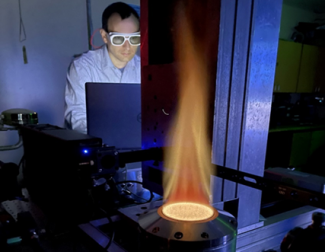As part of its mission to advance energy innovation, NETL organized and maintains a growing information-sharing consortium of researchers from sister national laboratories, private companies, federal agencies, and academia to gain a greater technical understanding of how to use ammonia in combustion processes like industrial furnaces, internal combustion engines and gas turbines — actions that can help the world transition to a carbon-free economy for net-zero carbon emissions by 2050.
Ammonia is an inorganic compound of nitrogen and hydrogen. Because global efforts to move away from carbon-intensive fossil fuels are increasing, interest is growing in clean, zero-carbon energy carriers and many believe ammonia could present an important alternative.
Ammonia has many attractive attributes for energy applications: It is carbon free and environmentally benign; it may be used as a hydrogen carrier because it has three atoms of hydrogen; production, storage, transportation and distribution are much easier and less complicated than many other fuels; it can be a potential replacement for gasoline, diesel and kerosene; it can be used, in addition to hydrogen, as a form of chemical energy storage for excess renewable energy in existing natural gas power systems; and it can be potential fuel solution for clean power generation in remote areas.
However, there is only partial understanding of the chemistry that governs ammonia combustion. That makes it difficult to maximize the performance of many energy systems that could rely on ammonia.
“That’s where the importance of the Ammonia Combustion Technology Group comes in,” NETL’s Clint Bedick, who helped organize the group, explained. “It’s a collection of researchers from a wide range of organizations who are interested in promoting a technical understanding about ammonia combustion for power and industry. We are gathering and sharing information and viewpoints from individual participants to reduce the risks and address challenges associated with developing the technology.”
“For example, some of the world's largest gas turbine engine manufacturers have expressed interest in and have active projects involving ammonia combustion technologies,” Bedick said. “However, none offer a commercial product capable of operating on ammonia or ammonia-mix fuels. This is largely due to technical challenges that must be overcome.”
He said specific research challenges include the low flammability of ammonia, a propensity for nitrogen oxide emissions, chemical kinetics uncertainties, limited experimental validation data, combustor design and optimization, and scaling to practical flows and geometries.
The Ammonia Combustion Technology Group was organized to share technical viewpoints from individual participants to address the challenges associated with developing the technology.
The group holds virtual meetings every first Tuesday of the month, which are open to the public. Specific dates and times for the meetings are shared on an NETL web page. Notes from previous meetings are also posted online. The next public meeting of the Ammonia Combustion Technology Group will occur 1-3 p.m. EDT Tuesday, September 5, 2023, via WebEx.
All information presented at the public meetings meet criteria for public sharing or be published and available in the public domain.
Because of its ongoing body of work, NETL is uniquely qualified to serve as the group’s hub.
“A major barrier to developing combustion strategies is a lack of high-quality fundamental validation data,” Bedick said. “That’s precisely what NETL expertise provides.”
Bedick said NETL’s Fundamental Combustion Laboratory enables research on the safe use of ammonia as a fuel source, in combination with other fuels such as hydrogen. The Lab’s work is helping acquire fundamental validation data that will allow researchers to make key adjustments and determinations for the efficient use of ammonia in engines and turbines for power generation.
Membership in the Ammonia Combustion Technology Group is growing. As of July, a few of the member organizations participating include the Ammonia Energy Association, Argonne National Lab, Baylor University, CF Industries, Electric Power Research Institute, Georgia Tech, GTI Energy, King Abdullah University of Science and Technology, Korean Institute for Energy Research, Lawrence Livermore National Laboratory, Louisiana State University, Mitsubishi, U.S. Navy, Purdue University, Sandia National Laboratory, Stanford University, the University of Sydney and many others.
NETL is a U.S. Department of Energy national laboratory that drives innovation and delivers technological solutions for an environmentally sustainable and prosperous energy future. By using its world-class talent and research facilities, NETL is ensuring affordable, abundant, and reliable energy that drives a robust economy and national security, while developing technologies to manage carbon across the full life cycle, enabling environmental sustainability for all Americans.




